“One bud and a leaf,” Meena Tokbipi says with confidence.
She repeats, “Yes. I pluck one bud and a leaf to produce quality green tea, and do not follow the more popular plucking standard of one bud and two leaves.
Stories of an eventful life journey of the self-made entrepreneur started unfolding as she plucks a handful of tea leaves in a small bamboo basket for a demonstration of making refreshing green tea from her small garden. The small tea garden occupies only six bighas of her 24-bigha plot of land (nearly 7.5 bigha equals a hectare).
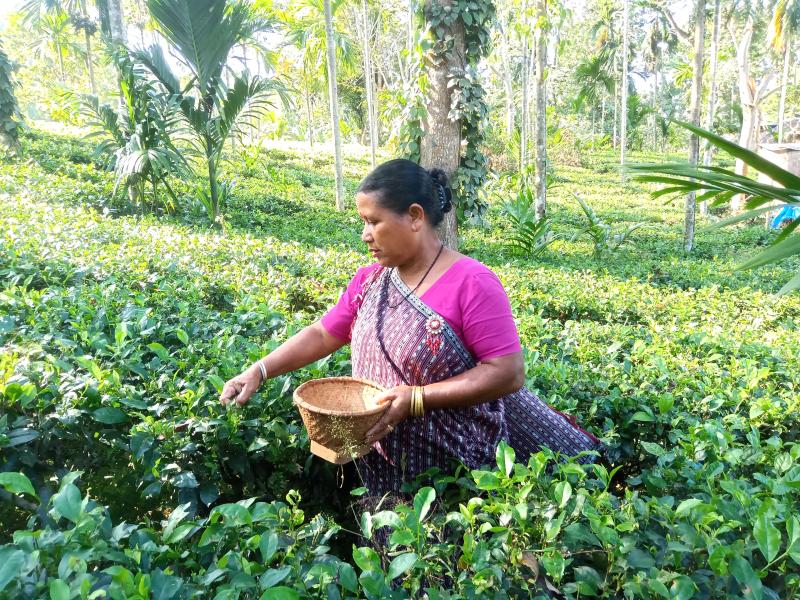
Meena Tokbipi plucking tea leaves (Pic- Sushanta Talukdar)
“I always believe that our tradition and heritage turn into wonderful stories when it is stimulated with new experimentation and innovation. I love to do that. This is how my tea-bushes have finally grown into a story telling garden,” says Meena Tokbipi, a widow in Kingthon Tokbi (Engle Pathar) village in Kohora range of Kaziranga National Park.
Meena Tokbipi, however, does not belong to a traditional tea-grower family. Whatever she has learnt is through trial and error. No doubt, she had to undertake a long and difficult journey. Her expertise in Sa Tokbe, the traditional handcrafted tea of the Karbis was a building block of the success story.
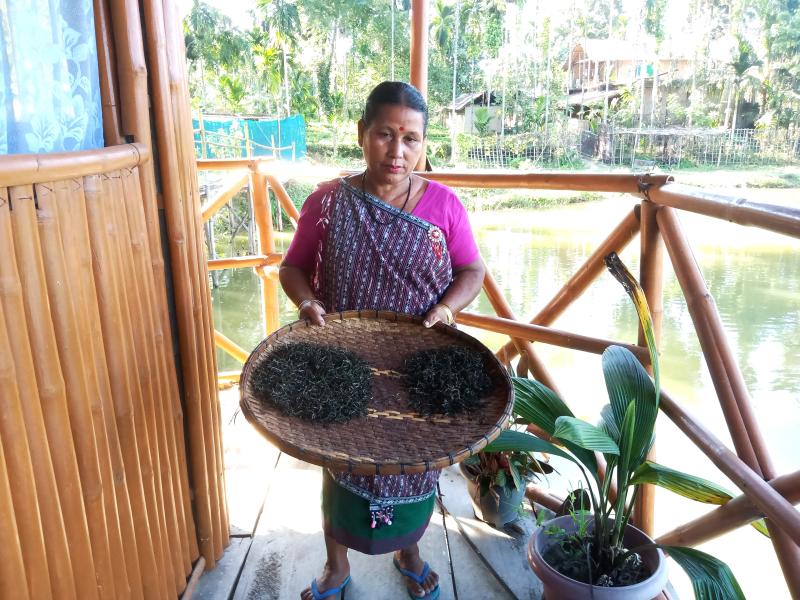 Meena Kramsapi showing her green tea and orthodox tea (Pic- Sushanta Talukdar)
Meena Kramsapi showing her green tea and orthodox tea (Pic- Sushanta Talukdar)
“When I started my small tea-garden nearly 18 years back, in 2005, I used to follow the plucking standard of ‘one bud and two leaves’. I used to sell them to local agents of big tea-gardens and accept whatever they offer for each kg of green leaves.”
She could live only hand to mouth with that earning. As a widow she had to struggle a lot to make both ends meet and to educate her three children.
Things, however, changed. And it changed for the better, when a team of Aaranyak, a research-based nature organisation contacted her as part of its initiative to improve livelihood of Indigenous Peoples and Local Communities living in Kohora-Karbi Anglong landscape of which Kaziranga National Park is a part. Aaranyak organised trainings in both green tea and orthodox tea for increased earning and improved livelihood.
The trainings motivated Meena Tokbipi not to limit her tea-growing dream to only supplying green leaf to big gardens and become a producer of green tea and orthodox tea. Today, she is also a master trainer of green tea and orthodox tea production in her locality.
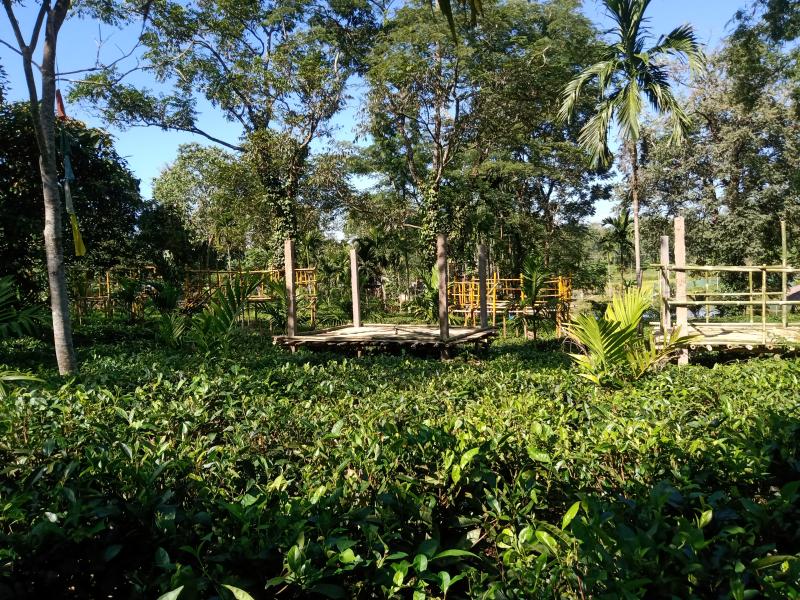
The garden and raised platform for tents (Pic- Sushanta Talukdar)
“The home-made green tea and orthodox tea that I started to produce on small scale gave me confidence for new experimentation. One day, I decided to adopt the plucking standard of ‘one bud and one leaf’ for making green tea. I went ahead with that. The result was indeed wonderful, not only in taste but in colour and aroma too”, she adds.
To produce high quality green tea, she puts the leaves in boiling water for 5-10 seconds immediately after plucking. After draining water, boiled leaves are rolled with hands and later dried under the sun. It takes two sunny days to get the best result of taste, colour and aroma. The buds turn into white colour and the leaves into dark colour to be the perfect organic green tea.
“When a little portion of such tea is poured into hot water for consumption, it immediately starts brewing the wonder story of freshness and strength. Green tea having buds with white colour is the best quality green tea and sold in high prices. Meena Tokbipi is a hardworking lady, who always love to add some own experimentation and innovation into her works,” says says Jayanta Kumar Sarma, Senior Programme Associate of Natural Resource Management Programme.
For orthodox tea, she follows the fine leaf plucking standard of ‘one bud and two leaves’. The leaves are kept in indirect sun light for some hours, rolled and then dried under the sun.
The Karbis have the traditional practice of producing Sa Tokpek--unique handcrafted tea that is prepared on Long Lengpun or wooden pounding for household consumption. The expertise of making handcrafted tea also helped Meena Tokbipi in adoption of orthodox and green tea, Sarma feels.
The process of making organic tea, orthodox tea and traditional handcrafted Karbi tea—all need certain crucial steps that is be followed meticulously. The buds and leaves can be plucked only once in a week during monsoon. Meena Tokbipi can produce only 250 grams of green tea a week from her garden. Such tea, made with unique craft has high demand in domestic and international market.
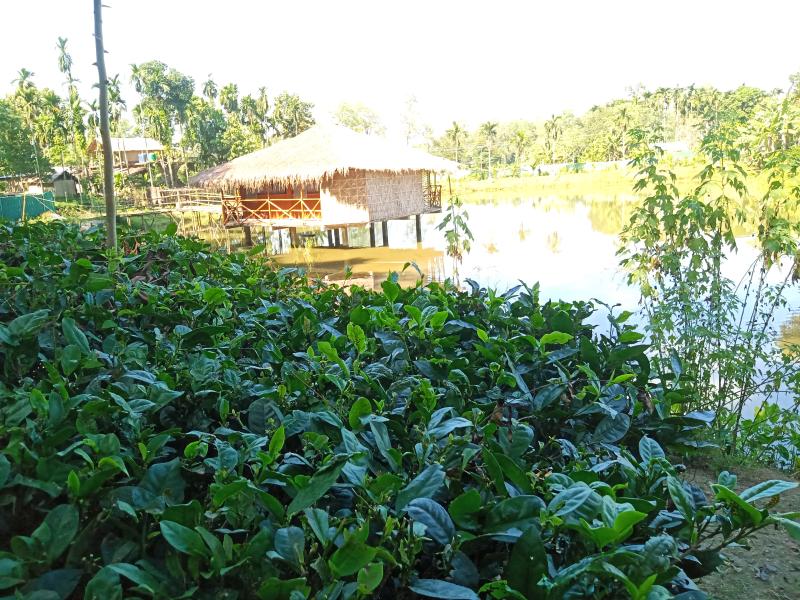 A bamboo stilt restaurant on the pond (Pic- Sushanta Talukdar)
A bamboo stilt restaurant on the pond (Pic- Sushanta Talukdar)
For day-to-day working including plucking and processing, she has engaged five women of her village, and thus it has also become an all-women tea-garden. One kilogram of green tea made by Meena Tokbipi sells for Rs 1800 while orthodox tea made by her sells for Rs 1600 a kg.
Inspired by her mother, Meena Tokbipi’s eldest daughter Moina Kramsapi (32) after completion of her graduation in Law, decided to give a lift to her mother’s story telling garden with the unique ideas of promoting eco-tourism and conservation of bio-diversity. Instead of seeking government jobs, she started her own eco-tourism venture Kramsa Rock Garden in 2019.
The hill belonging to the family and overlooking the small tea garden is full of pristine rocks, trees and natural greenery. Moina Kramsapi observed that a tranquil stream rolling down the hill curves along with the rocks make it a picture-perfect eco-tourism spot. And when idea of developing eco-tourism activities in the area that also support conservation came to her, she decided to give shape to her dream.
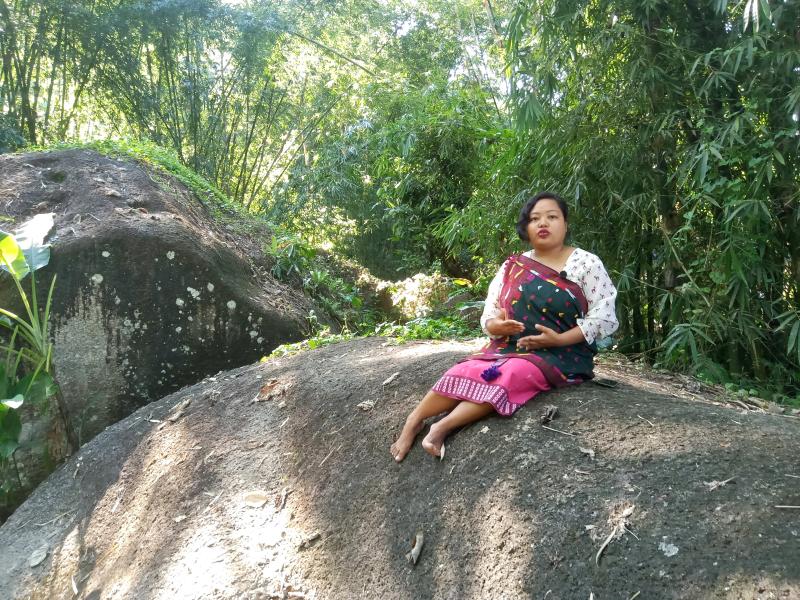
Moina Kramsapi (Pic- Sushanta Talukdar)
The young entrepreneur says that the idea of combining ecotourism with conservation came to her from her observation during travel to places like Darjeeling, Shillong. She visited those places with her scholarship money to explore ways of life and observed that people have developed unique eco-tourism opportunities out of their own natural properties.
The determination of her daughter impressed Meena Tokbipi and she gave Moina some money she had as savings. “The tea-garden is an added attraction. We put up tents on raised platform during winter, when tea bushes hibernate until the first flush of Spring,” she says.
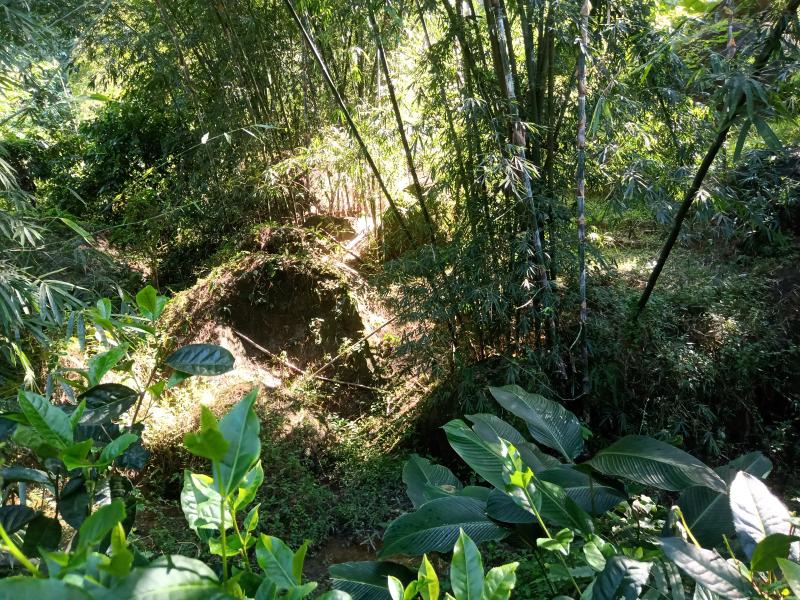 Bamboo bushes of Karmsa Rock Garden (Pic- Sushanta Talukdar)
Bamboo bushes of Karmsa Rock Garden (Pic- Sushanta Talukdar)
A bamboo stilt restaurant above a fish pond, serves traditional Karbi dishes to guests. Special dishes include Kangmoy, Kalangdan, and smoked meat in bamboo. The accommodation facilities include 12 tents. Moina Kramsapi s includes three meals, bonfire and hill trekking with single night stay.
The stream is full of small fishes of different varieties. Chirping of different birds and view of majestic hornbills in playful mood are also added attraction for guests to return.
She narrates that the entire area of this part of Karbi Anglong was once full of such ancient rocks. “Due to ignorance our people leased the large rocks in the hills for stone quarrying which led to destruction of the natural landscape and the rocks. But money they got in return was quite less. When I decided to conserve the rocks, it has helped to regenerate the water source and flow of water the stream increased. I have planted bamboo bushes and we also have a rubber garden”
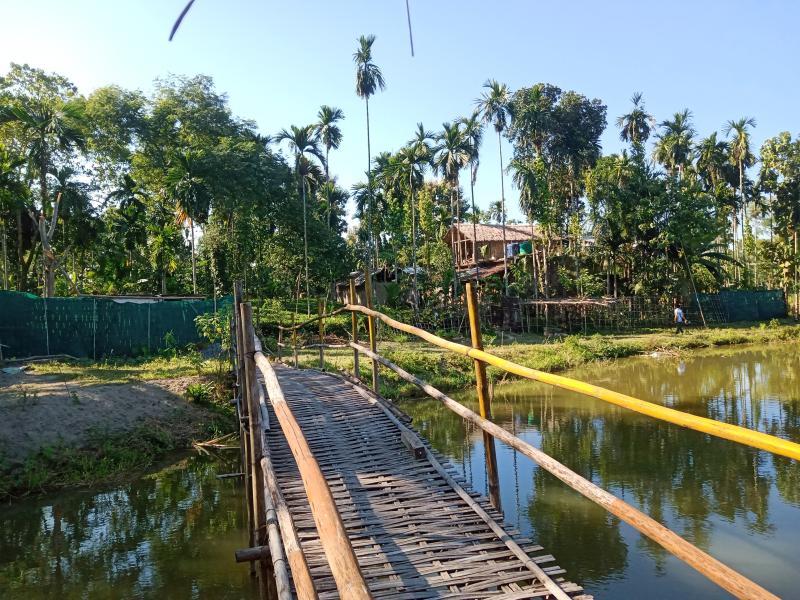 (Pic- Sushanta Talukdar)
(Pic- Sushanta Talukdar)
Moina Kramsapi is happy that her eco-tourism venture also helps restoration of ecology. The villagers consume water from the stream that percolates through the rocks.
“I am proud of my mother. As a widow, she had to struggle a lot to run the family. Now she is recognised as a unique tea producer that is appreciated by both domestic and international tourists who visit Kaziranga National Park. Whatever I have learnt, is from my mother,” she adds.
(This feature is based on a fieldwork carried out under an ongoing project of Aaranyak- a non-governmental organisation engaged in research-based conservation)